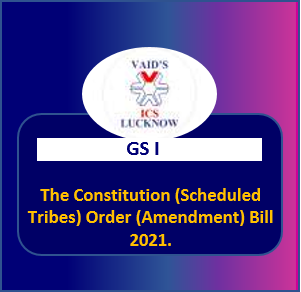CURRENT AFFAIRS
Get the most updated and recent current affair content on Padhaikaro.com
The Constitution (Scheduled Tribes) Order (Amendment) Bill 2021.
- Vaid's ICS, Lucknow
- 18, Aug 2021

Why in News?
More than a year after the Union Cabinet approved a proposal to amend the list of Scheduled Tribes in Arunachal Pradesh, Parliament last week passed the Constitution (Scheduled Tribes) Order (Amendment) Bill 2021.
Background:
- The Bill seeks to amend the nomenclature of certain tribes from Arunachal Pradesh mentioned in the Constitution (Scheduled Tribes) Order, 1950.
What does the Bill amend?
- The bill modified Part-XVIII of the Schedule to the Constitution (Scheduled Tribes) Order, 1950which is related to the state of Arunachal Pradesh.
- Part-XVIII lists 16 tribes of Arunachal Pradesh.
- The Bill corrects the names of tribes spelt incorrectly, and adds names of a few tribes that were either named ambiguously or had their parent group named only.
- The bill also restores the power of states to identify backward classes.
The five key changes are:
- Deleting‘Abor’ (tribe), because ‘Adi’ tribe in the list is same as ‘Abor’
- Changing‘Khampti’ to ‘Tai Khamti’
- Including ‘Mishmi-Kaman (Miju Mishmi)’, ‘Idu (Mishmi)’ and ‘Taraon (Digaru Mishmi)’ in lieu of Mishmi [Idu, Taroon]
- Including ‘Monpa’, ‘Memba’, ‘Sartang’, ‘Sajolang (Miji)’ in place of ‘Momba’
Replacing ‘Any Naga Tribes’ with names of 4 tribes:
- Nocte
- Tangsa
- Tutsa
- Wancho
GS II
Facts for Prelims
UP’s Two-Child Policy:
After reviewing over 8,000 suggestions from the public, the Uttar Pradesh State Law Commission has submitted a report and draft Bill of a new population control law (The Uttar Pradesh Population (Control, Stabilisation and Welfare) Bill, 2021) proposing two-child policy to the State government.
- Special facilities to all families (irrespective of the BPL category) who have only one child and undertake voluntary sterilisation.
- A person who has more than two children after the law comes into force would be debarred from several benefits such as welfare schemes.
- On World Population Day (11th July), the Uttar Pradesh government announced a new population policy for 2021-2030.
- The new policy has provisions to give incentives to those who help in population control.
The new policy aims at:
- Decreasing the total fertility rate from 2.7 to 2.1 by 2026 and 1.7 by 2030.
- Increase modern contraceptive prevalence rate from 31.7% to 45% by 2026 and 52% by 2030.
- Increase male methods of contraception use from 10.8% to 15.1% by 2026 and 16.4% by 2030.
- Decrease maternal mortality rate from 197 to 150 to 98, and infant mortality rate from 43 to 32 to 22, and under 5 infant mortality rate from 47 to 35 to 25.
- To increase the accessibility of contraceptive measures issued under the Family Planning Programme and provide a proper system for safe abortion.
- To reduce the newborns’ and maternal mortality rate.
- To provide for care of the elderly, and better management of education, health, and nutrition of adolescents between 11 to 19 years.
- The provision of this legislation shall apply to a married couple where the boy is not less than 21 years of age and the girl is not less than 18.
- The policy will be voluntary – it will not be enforced upon anyone.
Sonchiriya
- ‘SonChiraiya’ brand and logo has been launched by the Ministry of Housing and Urban Affairs for marketing of urban Self Help Group (SHG) products.
- This initiative will prove to be a right step towards increased visibility and global reach for the products made by the women of urban Self Help Groups.